Winter In NW Ohio
Winter In NW Ohio
-
-
-
-
-
Winter In NW Ohio
-
Post #1 - November 18th, 2014, 12:25 amI'll start this with no promises of regular updates. We got our first real snow Sunday evening. The predicted two inches turned out to be closer to 4", but since the ground isn't frozen yet, it looked like two when the sun came up. Anyhow, Monday morning was calm and still comfortable, so I took the camera along to do chores.
We'll start off with the beauty of winter.......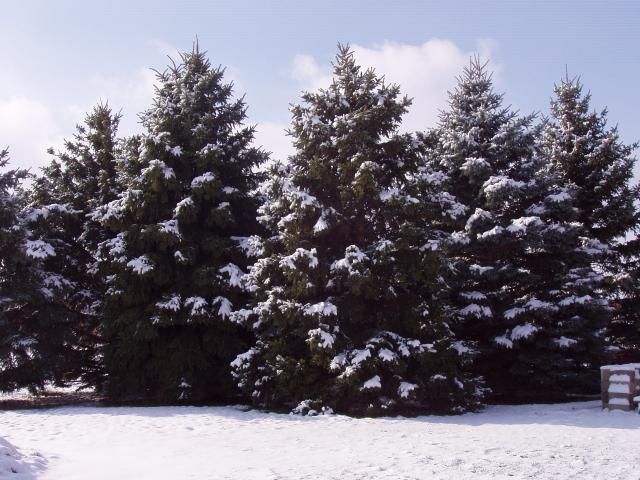
The cornfield across the road.....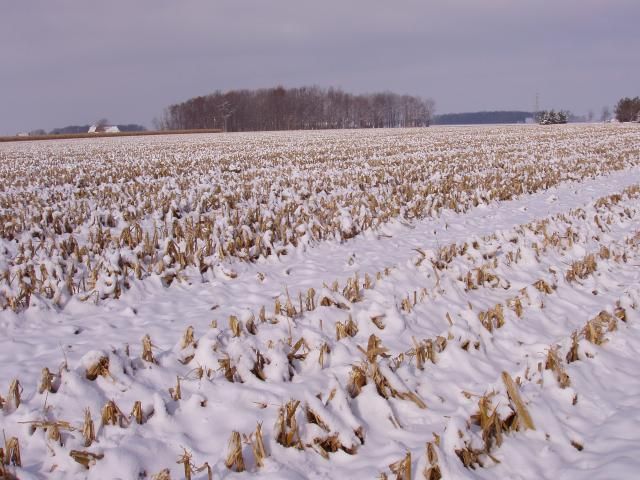
The soybean field you watched grow all year....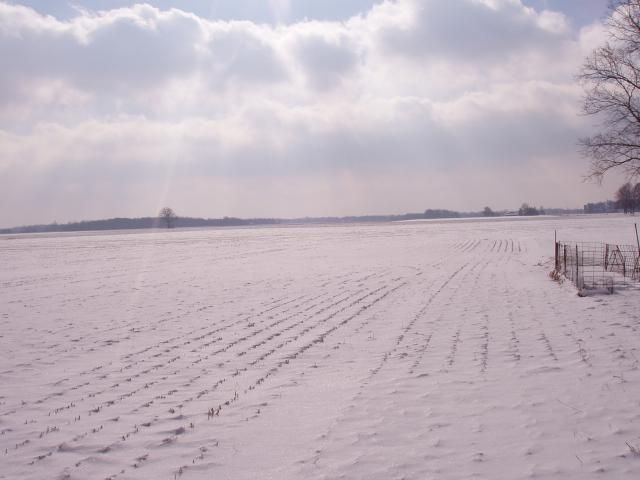
Icicles, way to early in the year.....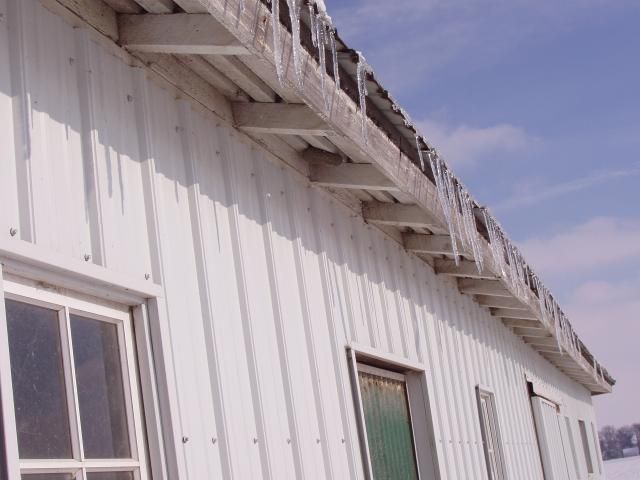
...... and some of the ugliness of winter. The neighbor had combine trouble. He ran until after dark Saturday evening, then had the service guys out, first thing this morning, from the local John Deere dealership. It must not have been an easy fix, he repairs 99% of breakdowns on his own. Working on equipment, in the cold, in the field, just sucks. He was back to harvesting shortly after noon. Service guys make pretty good money, but having to work on metal parts, probably without gloves, possibly soaked with some kind of fluid, in the cold........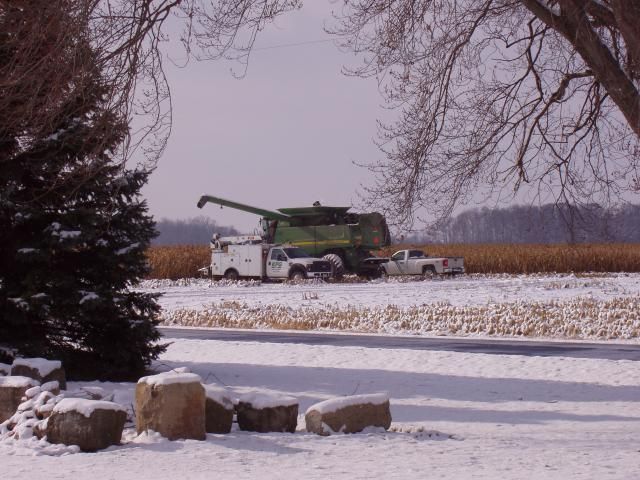
The pigs were full of piss and vinegar this morning, running around and woofing. It's usually a sign of a weather change, looks like they were right again....
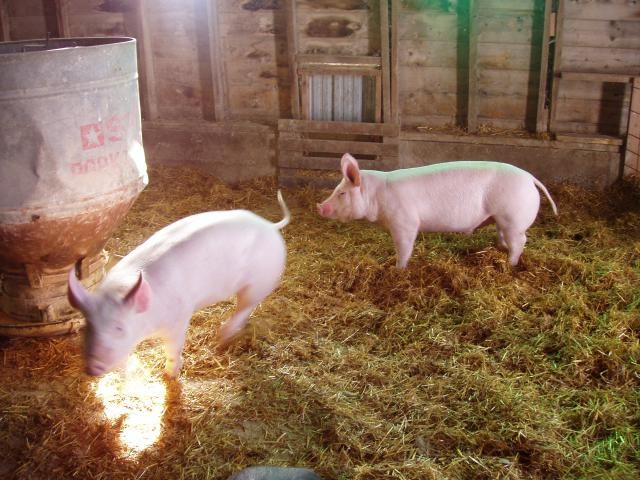
We have a climber. He goes by Frecklebutt. If he doesn't get enough ear scratching, and there's never enough, he'll climb the fence to get up close and personal. He's gonna be trouble before we're done.....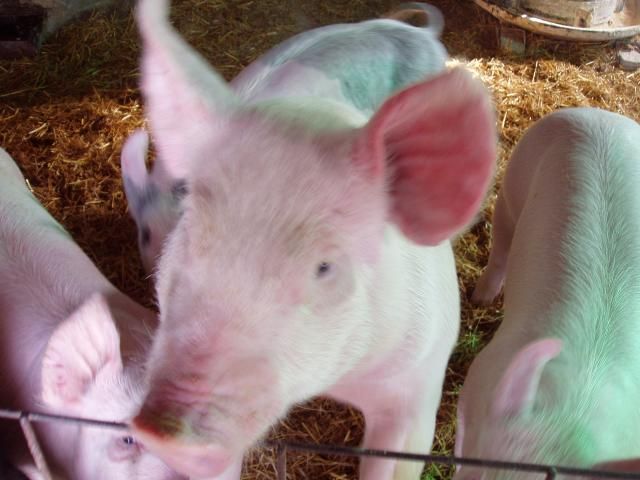
The newest chickens haven't seen snow like this before, they ran out in it for a second, then decided they'd rather be back inside. The rooster, who Denise has named Rusty, had to strut his stuff inside today.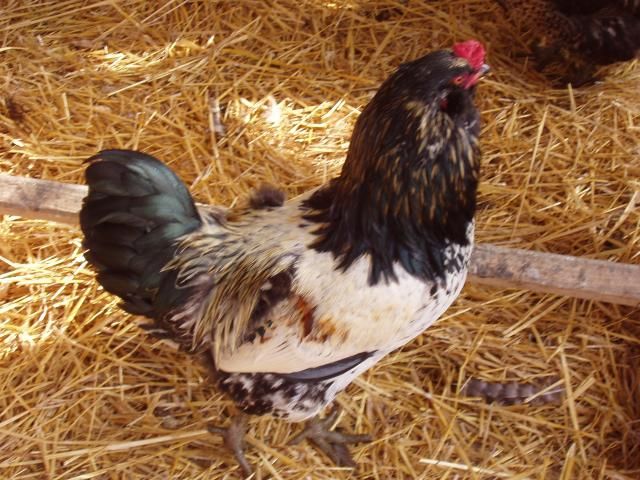
Last picture of winter. My buddy and his son went squirrel hunting Sunday. They came over Sunday afternoon, after a successful hunt. My friend hadn't been squirrel hunting since he was a kid, with his dad. He stopped in wanting me to walk him through cleaning it (his dad was out of town). He did fine, he could have done it on his own, once you learn how to dress one animal, they are all pretty much the same.
Squirrels are probably the hardest of the midwest game animals to skin, watching and coaching him to do it, reminded me why I don't hunt them anymore. I have to say, I had a hankerin' for some of the bounty after he was done though. They invited us over for supper, but one squirrel wasn't going to be enough to feed six people. They got to enjoy this hunt with the rest of their family. Next time, we'll go.
The least graphic photo I have....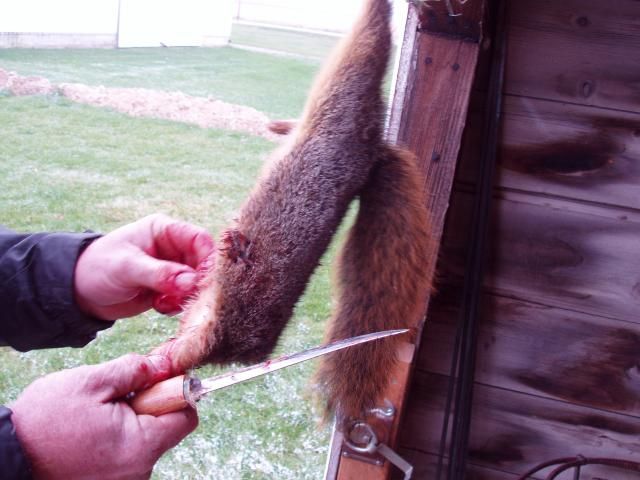
That's it, I'm hoping we still have some warm weather coming, we haven't really had Indian Summer yet. If not, I guess we are going to have winter. We'll take what we get, and we'll come through the other side stronger than we are now.
Embrace the cold!!
Tim
-
-
Post #2 - November 18th, 2014, 10:28 amNice pictures. The seasons turn. That is a good thing to me.Toria
"I like this place and willingly could waste my time in it" - As You Like It,
W. Shakespeare
-
-
Post #3 - November 23rd, 2014, 11:41 pmElfin asked in the Growing Season thread what happens in the winter time. This isn't how many people spend their winter, but it's how I'm spending mine.
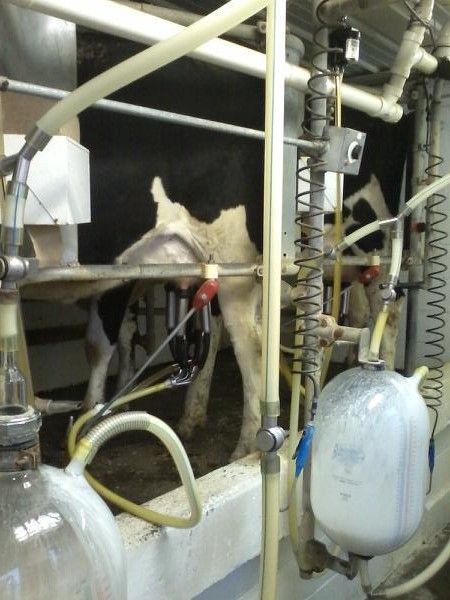
We milked when I was younger, I was about twelve when dad sold the cows, I worked my way through college milking & being a hired man on a dairy, outside of Wooster, OH in the heart of Amish country. When I graduated, my boss offered me a fulltime job milking & working for him, but my degree was in swine, so I figured I should get my money's worth out of my education.
I always enjoyed milking, but there aren't many small dairies left. I haven't touched a milker in 30 years. A few weeks ago, my wife met a small local dairyman, through a mutual friend. In the course of talking, she mentioned I used to milk. One thing led to another, and Saturday evening, I started (re)learning the ropes.
There are enough things I remember that it's not totally new, but there are enough things different to make it challenging. I went back tonight (Sunday), for another evening milking. I'll try to get over there as much as I can, over the next few weeks, to learn as much as I can. Right now, I need to get all the pre milking setup, milking and post milking cleaning and sanatizing down, then I'll go into the barns and learn all the feeding procedures, from bucket calves to cows.
It's a small dairy, the owner milks about 35 cows, but it will be close to 50 by the end of the year. He works by himself, his sons can cover him, but they all have families and jobs that take them away at times, so he can't schedule a day off too far in advance. He has a couple of friends that can step in, but he'd like to have another person available if everybody else is busy.
I'm hoping once I'm up to speed, I'll be able to pull a shift or two, a couple times a month or so, just to keep in practice. From what I've seen so far, the owner and I have very similar views on animal care/treatment and taking care of equipment and fixing things right when they break. He is a real stickler for cleanliness, and the premium he gets for his milk shows it.
I think we are going to get along well.
I'll take a few pictures as I go. I'm not going to claim to be a dairy expert, but I will be able to show you where milk comes from. This is turning into an interesting winter.
I said one time that wanting to taking care of livestock is a genetic defect, well, I have it. I came home tonight, splashed with about 20 different kinds of fluids, some natural, some not. I undressed in the garage and headed right for the shower. I can still smell iodine, disenfectant and sanatizer, on top of the usual cow smell you get from being head to udder with that size animal. Most of it is burned in my nose, I'm sure if you were standing next to me, you wouldn't notice..... all of that, and I can't wait to go back.
There is something wrong with me for sure......
Tim
-
-
Post #4 - November 24th, 2014, 1:47 pmI loved reading this, believe it or not, and want to read more.
My family are all from farm country in downstate Illinois. My grandmother grew up on a pig farm that we, her descendants, still own. On or very close to the farm is a cemetery in which, though I may have this slightly wrong -- my brother is the geneologist, not me -- are buried two brothers of the great-grandfather's generation who died in the same Civil War battle on the same day.
My siblings and cousins and I earn a little every year from the land trust that my aunt manages. Part of the land is rented out to a nearby farmer who grows crops and splits the profits with the trust, and part of the land, which is more wooded, has been made available to hunters. There is some interest in selling all this, because apparently land prices have been rising at crazy rates in recent years. But sell or just let the price rise even more? It may come down to when my aunt gets tired of managing the trust. Another factor is that the farmer who has rented the land for years is getting older and without adult children to pitch in is losing interest in farming quite that much land every year. But for us, there is a sentimental element that so far has kept us from letting go of Grandma's farm.
I want to learn more about this land of my family's and want to read more about your experiences, Tim, with crops, pigs, and dairy cows."Your swimming suit matches your eyes, you hold your nose before diving, loving you has made me bananas!"
-
-
Post #5 - November 24th, 2014, 2:02 pmHi Katie: I am curious if the farm does change hands whether it will remain a farm, or will be turned into a subdivision? I personally know several older farmers that have no children that want to take over the farm when they are forced to retire, and it is hard to find people that are willing to take over a farm. I do have a cousin who was forced to sell most of his farm a few years ago, and the CEO at Whirpool ended up buying it, and the last I heard he was going to open up a winery there.
THanks, Nancy
-
-
Post #6 - November 24th, 2014, 2:40 pmI honestly don't know for sure, Nancy, whose hands it would fall into. I think that may eventually depend on who my aunt thinks is the most suitable buyer. My siblings and cousins and I would have a say, of course, but my aunt knows the people and prospects around there the best.
It won't become a subdivision, I'm pretty sure of that. It's a small-town area where home prices are low because demand is low. I could (and sometimes want to) buy a fantastic Arts & Crafts bungalow or Sears-kit type house around there (in fact, not far away is a town full of Sears houses) for half of what my house here in the Chicago suburbs is worth, but if I did, I'd better be prepared to live in it for the rest of my life, because hardly any one ever moves there looking to buy a house. It's not land that someone's going to develop on a speculative basis.
I suspect that if the land gets sold eventually, if there's not much interest in farming the open land, the wooded part would be allowed to take over, and eventually it will become 100% hunting / forest / camping / hiking land. How soon that would happen may depend on whether there's some other farmer in the area that is interested in it as cropland."Your swimming suit matches your eyes, you hold your nose before diving, loving you has made me bananas!"
-
-
Post #7 - November 25th, 2014, 3:15 pmKatie wrote:I honestly don't know for sure, Nancy, whose hands it would fall into. I think that may eventually depend on who my aunt thinks is the most suitable buyer. My siblings and cousins and I would have a say, of course, but my aunt knows the people and prospects around there the best.
It won't become a subdivision, I'm pretty sure of that. It's a small-town area where home prices are low because demand is low. I could (and sometimes want to) buy a fantastic Arts & Crafts bungalow or Sears-kit type house around there (in fact, not far away is a town full of Sears houses) for half of what my house here in the Chicago suburbs is worth, but if I did, I'd better be prepared to live in it for the rest of my life, because hardly any one ever moves there looking to buy a house. It's not land that someone's going to develop on a speculative basis.
I suspect that if the land gets sold eventually, if there's not much interest in farming the open land, the wooded part would be allowed to take over, and eventually it will become 100% hunting / forest / camping / hiking land. How soon that would happen may depend on whether there's some other farmer in the area that is interested in it as cropland.
In a former life, I was on the board of a farmland preservation organization, The Land Connection, which is now based downstate. One of their missions beyond farmer training was connecting farmers to farms. You might find the farmland portion of their website of interest.
http://thelandconnection.org/farmlandComing to you from Leiper's Fork, TN where we prefer forking to spooning.
-
-
Post #8 - November 25th, 2014, 10:58 pmI have been interested in farms since I was in college in central Indiana. The big highway (65) did not make it directly to Muncie back then so we had to take a two lane road (Rt. 28) for the last 2 hours of the trip. We would do this at least 6 times throughout the year. This road took us through small towns and farms. There was no internet, I-Pads, Kindles etc back then so one had to look out the window. For this I am grateful. I would watch the seasons fly by as the farms did what they had to do-plant, till, reap, fertilize etc. I would be amazed at the small farms-a house, a barn, a shed and the fields. The houses were always neat, painted and had wonderful gardens. The driveways were always paved in winter and the leaves were always raked in Fall and the grass always mowed in the Spring and Summer. The barns were a bit run down compared to the houses. Each farm was unique. Now as we make the journey through Indiana-and other states in the midwest I see abandoned farm houses, dilapidated barns and huge fields that seem to go for on for miles.Huge irrigation systems water the crops. Enormous silos and grain elevators are eyed as well. Large pig farms set back from the road. Very few farmers' produce stands. I assume that independent farms have been sold, abandoned, foreclosed or otherwise and the large corporations have taken over. I can only assume that this is not unique to the midwest. So it is a pleasure to see livestock grazing in the fields and to see other things planted other than soy and corn. I hate to see it default to corporations as a way of life-and ancient life- will be forever gone.What disease did cured ham actually have?
-
-
Post #9 - November 26th, 2014, 12:11 amOK, if my time spent here does nothing else, we need to stop holding on to this corporate farm myth......
From the USDA:
Under the ERS definition, family farms represent 97.6 percent of all U.S. farms and are responsible for 85 percent of U.S. farm production.
Taken from here: USDA ERS
I will give you farms have gotten bigger. This has been going on since somebody discovered they were better at making beads than growing food, and could trade the beads for the food they needed. Since farmer Ug didn't need to spend time making beads anymore, he could do what he was really good at, and grow more food. Since he was now supplying two families and Mrs Ug still got her beads.
Farming has constantly changed. I am still amazed that 1954 was the year that there were more tractors than horses on US farms. 1954!! That's not that long ago.
The price of farmland, equipment, seed, feed, buildings, everything that goes into living, has increased faster than the price of the crops and livestock being sold. This means you need to have more for sale, at smaller margins, to make a living.
There is a thread going on right now, someplace on LTH, about the price of beef tenderloin. This is what happens when production isn't plentiful enough to flood the demand. The prices go up. The beef guys are making pretty good money right now, and the herds aren't expanding because there is more money in selling calves for beef, than keeping them for breeding.
Everybody wants cheap food, including the Gov't, this has led to bigger farms.
My great grandpa was happy to grow enough food to feed his family, and have extra to sell for a roof over his head, coffee & gunpowder. Today, one US farmer feeds 155 people. And those 155 people don't want to pay too much to eat.
The old barns aren't useful anymore,they are too small to park today's machinery in. The number of livestock you need to make a living today pretty much makes these old barns obsolete, as feeding floors. Property taxes are so high you can't afford to have them around if they aren't useful...... so that's the end of the old barns.
As romantic as old farm houses are, they are outdated, crooked, drafty and hard to heat. Most people would like to live in a modern home..... old farm houses are going away. As the small farms are bought up, the old houses are being torn down or abandoned. It has become so hard to get rid of people that quit paying rent, that's it's better to not start renting the house out in the first place. That's not said to be cold and heartless, but it's a fact in the modern world.
I've been rambling again...... I hope this all makes sense. Just because farms have gotten larger, doesn't make them less of a family farm, they just look different. I'm sure my Grandpa grumbled about the number of cars on the road, making it hard to drive his buggy........ and we grumble about potholes on roads that were mud 100 years ago, times change.
...... but please, stop thinking that corporations are running American agriculture. Nothing could be further from the truth.....
I'm kicking my soapbox back into the corner.....
Tim
I will edit this to say I am in no way, intending to degrade, besmirch, or in any way trying to make Elfin look or feel bad, in any way shape or form. It just happened to be that post that hit when I was in the mood to type, kind of like the perfect storm. I miss seeing the little farms/farmers too, but they are gone. You can't change it and there is nobody to blame.
-
-
Post #10 - November 26th, 2014, 1:04 amFreezer Pig wrote:OK, if my time spent here does nothing else, we need to stop holding on to this corporate farm myth......
From the USDA:
Under the ERS definition, family farms represent 97.6 percent of all U.S. farms and are responsible for 85 percent of U.S. farm production.
Taken from here: USDA ERS
I will give you farms have gotten bigger. This has been going on since somebody discovered they were better at making beads than growing food, and could trade the beads for the food they needed. Since farmer Ug didn't need to spend time making beads anymore, he could do what he was really good at, and grow more food. Since he was now supplying two families and Mrs Ug still got her beads.
Farming has constantly changed. I am still amazed that 1954 was the year that there were more tractors than horses on US farms. 1954!! That's not that long ago.
The price of farmland, equipment, seed, feed, buildings, everything that goes into living, has increased faster than the price of the crops and livestock being sold. This means you need to have more for sale, at smaller margins, to make a living.
There is a thread going on right now, someplace on LTH, about the price of beef tenderloin. This is what happens when production isn't plentiful enough to flood the demand. The prices go up. The beef guys are making pretty good money right now, and the herds aren't expanding because there is more money in selling calves for beef, than keeping them for breeding.
Everybody wants cheap food, including the Gov't, this has led to bigger farms.
My great grandpa was happy to grow enough food to feed his family, and have extra to sell for a roof over his head, coffee & gunpowder. Today, one US farmer feeds 155 people. And those 155 people don't want to pay too much to eat.
The old barns aren't useful anymore,they are too small to park today's machinery in. The number of livestock you need to make a living today pretty much makes these old barns obsolete, as feeding floors. Property taxes are so high you can't afford to have them around if they aren't useful...... so that's the end of the old barns.
As romantic as old farm houses are, they are outdated, crooked, drafty and hard to heat. Most people would like to live in a modern home..... old farm houses are going away. As the small farms are bought up, the old houses are being torn down or abandoned. It has become so hard to get rid of people that quit paying rent, that's it's better to not start renting the house out in the first place. That's not said to be cold and heartless, but it's a fact in the modern world.
I've been rambling again...... I hope this all makes sense. Just because farms have gotten larger, doesn't make them less of a family farm, they just look different. I'm sure my Grandpa grumbled about the number of cars on the road, making it hard to drive his buggy........ and we grumble about potholes on roads that were mud 100 years ago, times change.
...... but please, stop thinking that corporations are running American agriculture. Nothing could be further from the truth.....
I'm kicking my soapbox back into the corner.....
Tim
I will edit this to say I am in no way, intending to degrade, besmirch, or in any way trying to make Elfin look or feel bad, in any way shape or form. It just happened to be that post that hit when I was in the mood to type, kind of like the perfect storm. I miss seeing the little farms/farmers too, but they are gone. You can't change it and there is nobody to blame.
SaveThere are some secrets which do not permit themselves to be told. (Poe)
-
-
Post #11 - November 26th, 2014, 8:58 amGreat post FP--and I'm guessing Elfin will be as interested as the rest of us in the behind the scenes look at the farming world. Care to share any thoughts on what you see happening down the road?"Knowledge is knowing a tomato is a fruit; wisdom is not putting it in a fruit salad." Miles Kington
-
-
Post #12 - November 26th, 2014, 6:22 pmWisconsin dairy farmers are having a spectacular year, due to a combination of high milk prices, demand for cheese, and low feed prices resulting from favorable weather. Yay cheeseheads!
-
-
Post #13 - November 26th, 2014, 6:33 pmIt heartens me to read this. I have a book coming out titled Midwest Maize, and in the book, I emphasize the fact that most farms are family farms and larger size is about survival. Makes me feel more confident about what I've written to encounter it here. (I visited a lot of farms, including in Ohio, during the research stage, but one is still pleased to get affirmation that one is on the right track.) It also makes me smile because it's a world with which I have fallen in love. Thank you for farming, FP."All great change in America begins at the dinner table." Ronald Reagan
http://midwestmaize.wordpress.com

